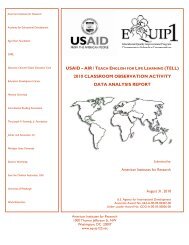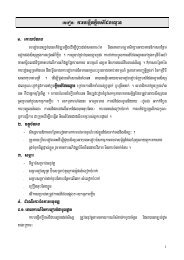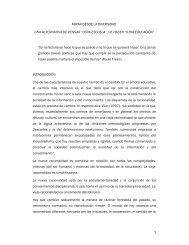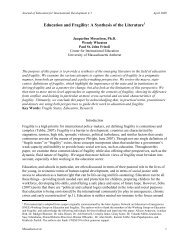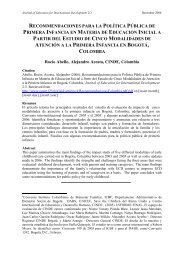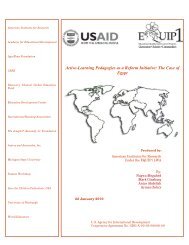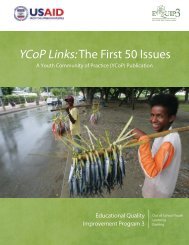The Power of Persistence: Education System ... - EQUIP123.net
The Power of Persistence: Education System ... - EQUIP123.net
The Power of Persistence: Education System ... - EQUIP123.net
You also want an ePaper? Increase the reach of your titles
YUMPU automatically turns print PDFs into web optimized ePapers that Google loves.
the growing political will and capacity <strong>of</strong> actors at various levels <strong>of</strong> the education<br />
system and in the community toward implementing decentralization and<br />
community participation. 3<br />
Particularly in the case <strong>of</strong> USAID projects, the assistance has financed the<br />
support <strong>of</strong> a number <strong>of</strong> international NGOs in providing studies/assessment,<br />
technical assistance, in country and overseas training, and management support.<br />
<strong>The</strong> active engagement <strong>of</strong> Egyptian and, in smaller numbers, international staff<br />
and consultants hired by these organizations has contributed to the continuous<br />
advancement <strong>of</strong> the education programs as they move between and among projects,<br />
and in and out <strong>of</strong> the Ministry <strong>of</strong> <strong>Education</strong>. This fluid exchange <strong>of</strong> expertise,<br />
experience, and perspective has contributed to a deepened base <strong>of</strong> expertise in<br />
the country that is able to develop effective working relationships between the<br />
government at all levels and the international community and projects.<br />
This latter point is an important factor, in view <strong>of</strong> the fact that despite consistent<br />
international encouragement and pressure for decentralization over this period,<br />
it is only recently that significant progress has been made in instituting national<br />
reforms in this direction. Earlier “interventions” in this regard in Egypt may have<br />
been less effective because they were less concerted and sometimes contradictory,<br />
or because more time was required for the contributions to accumulate. However,<br />
it is also clear that national and local actors, and their relationships, collaborative<br />
and conflicting, are an important part <strong>of</strong> the story <strong>of</strong> reforming education<br />
governance and management in Egypt.<br />
ExTERNAL FORCES AND gLOBAL TRENDS<br />
In addition to the role played by international organizations within Egypt, we<br />
should also note the role they played in organizing events and disseminating<br />
associated declarations outside Egypt. Most notable in this regard are the<br />
1990 Jomtien, Thailand, World Conference on <strong>Education</strong> for All and the 2000<br />
Dakar, Senegal, World <strong>Education</strong> Forum. <strong>The</strong>se events, in which high-level<br />
delegations from Egypt participated, served as a) platforms for Egypt to share<br />
its commitments and accomplishments, b) stimuli for government efforts to<br />
engage in further reform activities, and c) catalysts for international organizations<br />
to devote resources in support <strong>of</strong> the reform <strong>of</strong> educational governance and<br />
management in Egypt. In Egypt and other countries, national government<br />
<strong>of</strong>ficials have used select aspects <strong>of</strong> such international events to promote domestic<br />
support when the international agenda coincides with their own.<br />
3 Notice how the global level developments connect to the national level factors <strong>of</strong> “political will” and<br />
“institutional capacity.”<br />
60<br />
SECTION 2: lESSONS fROM COUNTRY CASE STUdIES



